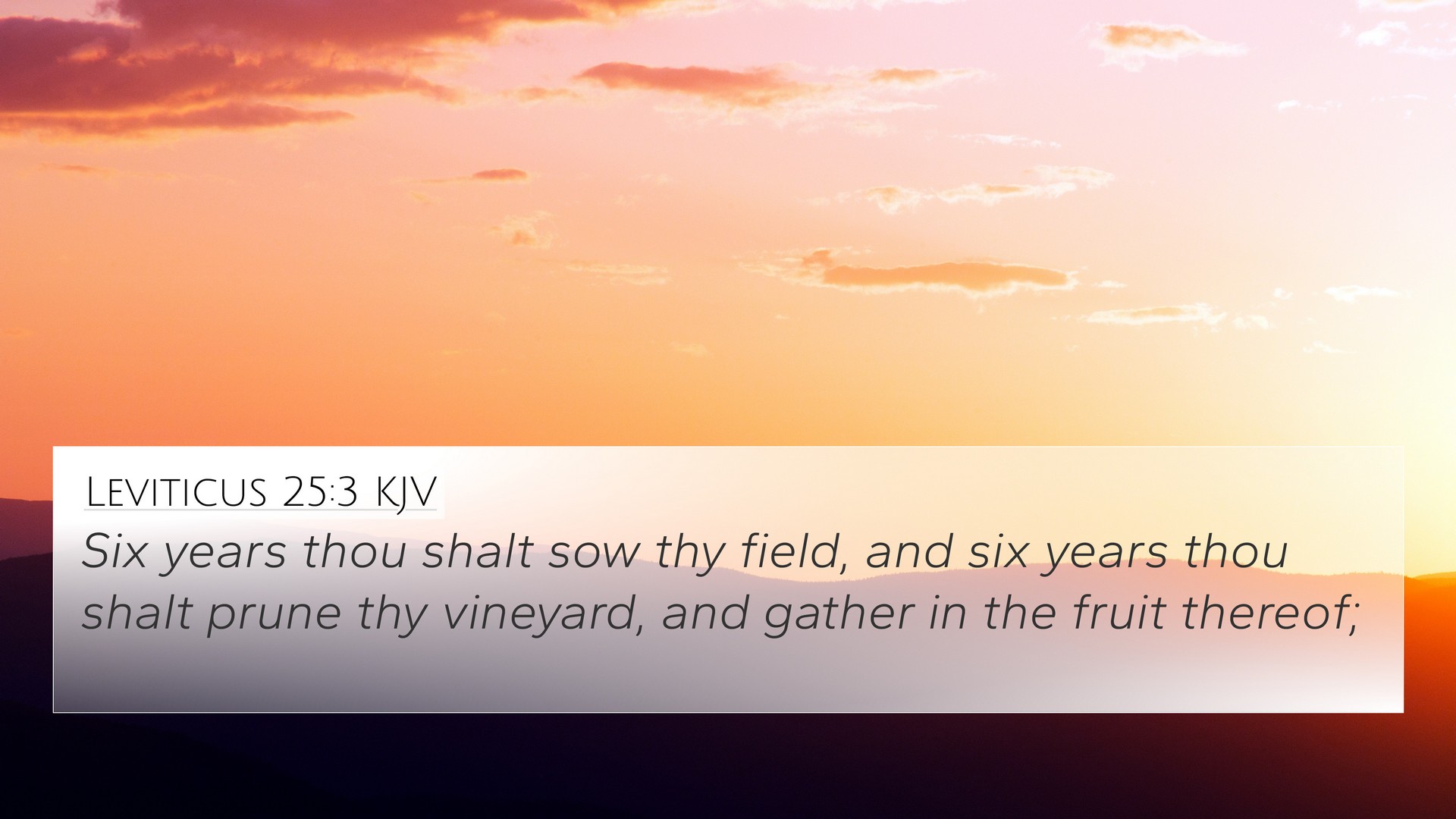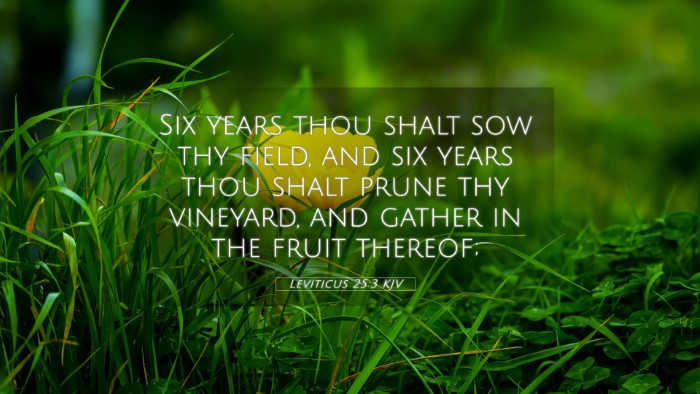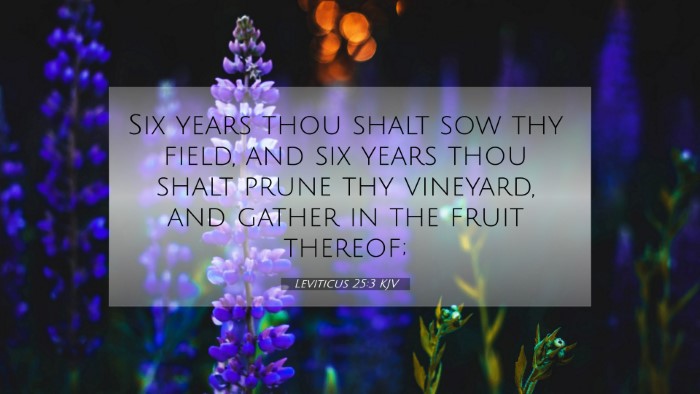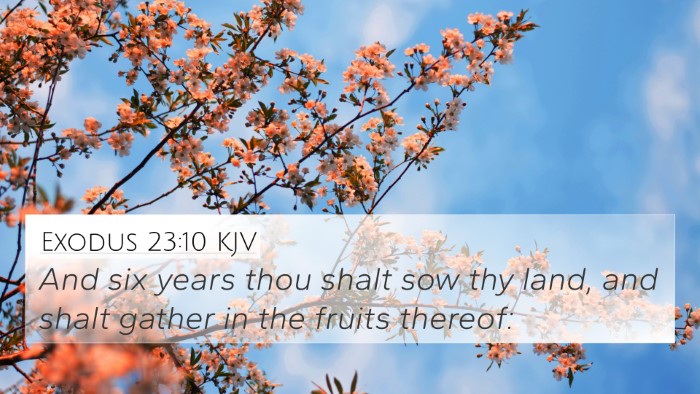Understanding Leviticus 25:3
Leviticus 25:3 states: "Six years you shall sow your field, and six years you shall prune your vineyard and gather its fruit." This verse is situated within the context of God's laws concerning the land of Israel and the observance of the Sabbath year. Below is a summary of the meaning derived from various public domain commentaries.
Context and Significance
The instruction to sow for six years and allow the land to rest in the seventh portrays not just agricultural wisdom but also a profound theological understanding of rest and divine provision.
- Matthew Henry's Commentary:
Henry emphasizes the importance of the land's rest, illustrating God's design for balance in creation. The six years of labor followed by a year of rest reflects God's work in creation, emphasizing the rhythm of labor and rest.
- Albert Barnes' Notes:
Barnes points out that this command is a reflection of God's sovereignty over the land, which must be treated with respect and care. The rest allows not only for the land's recuperation but teaches humans to rely on God's provision rather than their own labor.
- Adam Clarke's Commentary:
Clarke interprets the verse as a foreshadowing of future divine principles, where rest becomes a spiritual and moral imperative as well. He argues that the cycle of work and rest mirrors the pattern of the Christian life of faith and obedience.
Thematic Connections and Cross-References
This verse is intricately linked to various themes throughout Scripture, illustrating a consistent biblical theology of work, rest, stewardship, and divine provision. Here are some relevant Bible cross-references:
- Exodus 23:10-11: "For six years you shall sow your land and gather in its produce, but the seventh year you shall let it rest and lie fallow..." - reinforcing the sabbatical principle.
- Deuteronomy 15:1: "At the end of every seven years you shall grant a release of debts." - highlighting the importance of rest not only for the land but for society's economic structure.
- Genesis 2:2-3: "And on the seventh day God finished his work that he had done and he rested..." - the creation account establishes the divine precedent for rest.
- Hebrews 4:9-11: "So then, there remains a Sabbath rest for the people of God..." - connecting the physical rest of the land with spiritual rest in Christ.
- Ezekiel 34:14: "I will feed them with good pasture, and on the mountain heights of Israel shall be their grazing land." - a promise of provision during the sabbath rest.
- Matthew 6:31-33: "Therefore do not be anxious, saying, 'What shall we eat?' or 'What shall we drink?'... seek first the kingdom of God..." - emphasizes dependence on God's provision.
- James 5:7: "Be patient, therefore, brothers, until the coming of the Lord. See how the farmer waits for the precious fruit of the earth." - illustrating the farmer's waiting aligns with God’s timing.
- Isaiah 58:13-14: "If you turn back your foot from the Sabbath, from doing your pleasure on my holy day..." - speaks to the importance of observing sacred rest.
- Colossians 3:23-24: "Whatever you do, work heartily, as for the Lord..." - tying in the theme of labor and divine service.
- Romans 8:19-21: "For the creation waits with eager longing for the revealing of the sons of God..." - the creation’s cycle of rest and renewal as part of God’s redemptive plan.
Conclusion
The command in Leviticus 25:3 is not merely about agriculture; it embodies God's pattern of work and rest that permeates through Scripture. By understanding this verse through the lens of various commentaries, we see that it offers profound insights into God's design for creation, human labor, and spiritual rest.
For those seeking to delve deeper into the connections between Bible verses, utilizing tools for cross-referencing can greatly enhance study. A Bible concordance or cross-reference guide provides valuable resources to discover thematic links and gain deeper insights into scripture.
Further Study Suggestions
Consider exploring the following study methods and resources to enhance your understanding:
- Using a Bible concordance to find similar themes across both the Old and New Testaments.
- Engaging in cross-reference Bible study to deepen your grasp on inter-Biblical dialogues.
- Exploring comprehensive Bible cross-reference materials for sermon preparation and deeper personal study.



